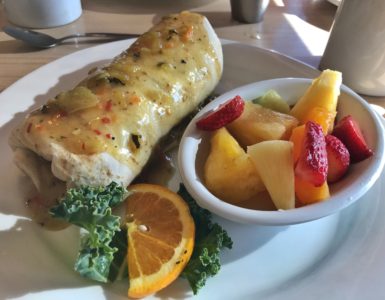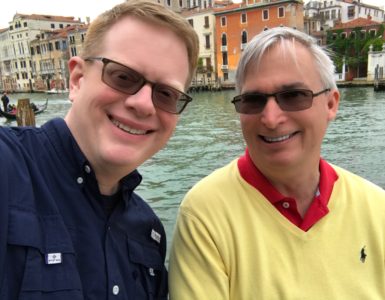About three months ago, Clyde and I both decided to eliminate artificial sweeteners and products containing high-fructose corn syrup from our diets. Why did we do this? What’s happened since then? Here’s a little background on our experiment, along with some interesting results.
What We’re Up To
This particular adventure really began quite a while back, when we decided to stop consuming aspartame, also known as NutraSweet. I’m a guy who makes his living by finding just the right words at just the right time, and I had noticed that, as my consumption of Diet Coke and NutraSweet increased, my bouts of aphasia — the inability to recall a desired word — had also increased in their frequency and severity. (I was almost constantly talking this way: “Hey, would you hand me that … that thing over there … that metal thing … no, that thing, the one for eating cereal. The spoon! Hand me the spoon!”)
Good news: within a week of going off of NutraSweet, my fluency with words returned, and my aphasia went away entirely. That fast, dramatic difference made us wonder about the impact of the other artificial sweeteners we were consuming.
Though we had no health issues associated with gulping down Splenda — in Diet Cokes, in Diet Rite drinks, in tea and coffee, in pre-packaged foods — we elected to reduce (and eventually eliminate) sucralose from our diet, too. The primary impact of this change has been financial: Diet Cokes and other sodas have dropped from our shopping list. Again, good news: once you swap home-brewed tea and fruit juices for pre-packaged sodas, you’ll feel the difference in your wallet (and your head, and, very likely, your waistline) right away.
A growing number of articles are raising concern about another substance that, really, ought to be called an artificial sweetener: HFCS, or high-fructose corn syrup. While the name suggests that high fructose corn syrup is something Native American maidens squeeze from whole ears of corn, the truth is far more sinister: HFCS is brewed in huge vats in a wicked stew of chemicals and enzymes.
HFCS is super-sweet and super-cheap, which is why almost all soft drink manufacturers have switched to it from sugar. Its appearance in the American diet also correlates closely with the onset of our current plague of obesity. Its most sinister quality? Reducing the brain’s ability to tell when the stomach is full.
There’s good evidence the body handles HFCS differently than it does sugar, and more and more articles are warning about its ill-effects. (It won’t go away any time soon, though, even if it’s killing us all — because America’s got a lot of corn, and the corn lobby in America is one of agriculture’s most powerful political lobbies.)
The Challenge
While getting NutraSweet and Splenda out of our diets was pretty easy … getting HFCS completely out of our bodies is proving to be almost impossible. Start reading labels, and you’ll be shocked at just how many products are laced with the stuff.
Sure, it’s in every canned soda … but it’s also in everything from health drinks to so-called “100 percent natural fruit juices.” You’ll also find it squeezed into baked goods, canned vegetables, breads, soups, ketchup, sandwich meats, hot dogs, jams and jellies, taco sauce, salsa, low-fat half-and-half — you name it. (I was shocked to see it as the second ingredient in one brand of frozen pizza I love. The second ingredient! That means there’s more HFCS in that pizza than meat, tomato sauce, or cheese.)
American food, by and large, has turned into one greasy, sugary sweet treat. No wonder we’re all too fat to fit into x-ray machines and CAT scanners!
The Results
After three months or so of doing our best to limit or avoid artificial sweeteners (including HFCS) from our diets, here’s where we are:
1) We drink a lot of tea. Black teas, white teas, and green teas, all unsweetened (or, in Clyde’s case, with a tiny amount of raw cane sugar), have become our drinks of choice. As it turns out, I really like the taste of unsweet tea (and only very mildly sweetened coffee). And hey, in a country where every service station stocks a hundred different HFCS-laden soft drinks and energy drinks — why is it so honkin’ hard to buy a bottle of unsweetened tea?!?
2) We drink almost no soda. Sodas and most fruit juices are laced with NutraSweet, Splenda, HFCS, or, in some bizarre cases, all three. Since we’ve switched to caffeine-free teas, we feel better … but we’ve really, really noticed the difference in our wallets. Sodas are expensive, sweetened water, and you can drink a lot of tea for the price of a can of Coke.
3) Our cravings for food, especially sweets, have all but vanished. Here’s a funny story. Last Sunday, for the first time in months, I scarfed down a Diet Coke sweetened with NutraSweet with my lunch. Later in the day, I found myself absolutely craving sweets. I mean, I had to have them.
I used to feel these kind of compulsions all the time, and was glad to be free of them, so the craving really surprised me.
Clyde, too, had pounded down an artificially-sweetened beverage with lunch … and, without knowing my story, he came home and said, “i don’t know what’s wrong with me, but, despite the fact I’ve eaten more today than I’ve eaten in weeks, I’m starving!”
Only later did we put it together: once we had the artificially-sweetened drink, our food cravings returned. Now that we’re off of them again, they’re gone. We suspect that eating zero-calorie sweeteners “prime” the body to look for the calories it thinks should accompany the consumption of sweets … and that, when it doesn’t find them, the cravings begin. if that’s true … maybe artificial sweeteners are behind millions of failed diets!
4) Real food tastes better. With our palettes unsullied by a constant barrage of sweet, sweet, sweetness, we’re noticing more complex flavors in our food: the nutty taste of teas, the subtle cinnamon note in coffee, the touch of citrus in fresh vegetables. Because the best (and, really, the only) way to avoid HFCS is to buy fresher, organic foods, we’re also eating better food that’s better for us.
Also: I’m not a big eater of vegetables, but I have discovered that I love them cold and raw, dipped in Newman’s Organic (HFCS-free) dressings. Vegetables actually taste good this way … a fact that shocked me!
5) We find that sugar regulates itself. Instead of eating artificially sweetened syrup on our pancakes, we’re using pure sorghum syrup. When we can, we’re eating food sweetened with sugar or cane syrup instead of HFCS. Instead of dumping Splenda into our coffee, we’re using just a touch of raw, unrefined sugar.
And you know what? Since we’ve made friends with sugar, we’ve discovered that a little sugar goes a looong way. When we do have something sweet, we have less of it … because real sugar satisfies us in a way that artificial sweeteners and HFCS cannot.
My Challenge to You
Here’s a wager for you: for just one week, make an effort to eliminate NutraSweet (aspartame), Splenda (sucralose), and HFCS (high fructose corn syrup) from your diet. You’ll have to read a lot of labels. You’ll have to get over your corporate-induced fear of a packet or two of raw sugar. You’ll have to look for more organic products and avoid more pre-packaged foods. You’ll have to start asking questions about the slop your favorite restaurants serve.
But, at the end of that week, I’ll wager you’ll feel better than you have in ages. Your conversation will flow. Your creativity will spike. Your appreciation for the food you do eat will increase. In short: you’ll be shocked at how the world around you changes.
If you take me up on the challenge, let me know.





In college, my friend conducted studies on rats and found that the rats that were fed diet sodas gained more weight than those that drank standard sodas. Her conclusion was that the artificial sweeteners began to trick the brain and the “full” response was altered. The brains of the Nutrasweetened rats could not easily calculate when they were full because the brain normally uses sugar intake as a meter for fullness. Artificial sweeteners remove that natural ability. *Hope all that made sense. I’m in a rush.
Since, there are studies that have been conducted and come to the same conclusion.
Easiest way to lose weight? Stop using artificial sweeteners completely.
Pure sugar is not evil and not unhealthy… Too much is! It’s certainly healthier than 16oz of artificial chemicals.
I’m really glad to hear about this for you guys!
And I’m really glad to hear about your experience with aphasia and your return.I had actually never heard of it before, but have been suffering from it for years. It’s really quite maddening at times. And I think it co-incided with my increased consumption of Diet Coke. I had always been a DC drinker, but when I stop smoking maybe about 8 years ago, my consumption probably doubled and that’s when my aphasia started.
It’s been tough trying to get off my Diet Coke habit, but I think this might inspire me.
And yes, HFCS is a pain when you are trying to find foods that don’t contain it. I stopped eating real sugar some time ago when I started low-carbing. I’m sure I have small amounts here and there in some foods, but it’s very small amounts. I find that by keeping to whole foods (fruits, vegs, meats, nuts, etc) I really dont’ have to think about it too much.
Mark! I never thought about NutraSweet as being the cause of my aphasia. Thank you for the tip!
I cut way back on Diet Coke several years ago when I realized it was giving me headaches. A side benefit to stopping was that I discovered that it also tended to make me just a bit depressed. Unfortunately, I still crave my Diet Coke and Diet Pepsi. But I think you’ve helped me commit to giving it up completely.
Thanks!
Yay – I agree with you 100%. I refuse to eat or drink anything with artificial sweeteners in it. My mom does low-carb dieting with Splenda, which is arguably better than others, but only because of lack of known problems. I have been trying to convince her for years that a small amount of sugar is better than fake sweeteners.
This year I have been getting an organic farm food share, which even at half a share is so much fruits and vegetables that I can almost not eat anything else (if I want to use it mostly up). I have lost a lot of weight and my food budget has decreased, plus I’m supporting local farms and eating organic. Woohoo! 🙂 and yes, I drink mostly water, skim milk, and coffee (my one vice!).
So interesting about the aphasia. None of us need THAT in our lives, especially writers. Good catch! – Teresa